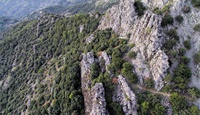
“Geoparks are not just about rocks and fossils.”
The GGN – Global Network of National Geoparks is a voluntary Network of exchange and cooperation of National Geoparks that is supported by UNESCO. The Network was created aiming at the protection and promotion of the geological, natural and cultural heritage of rural areas in Europe, developing and promoting educational and agritourism activities with high quality standards.
Through their participation in the Network, Geoparks have the possibility of cooperating and using the best practices, as well as participating collectively in projects and programmes for the development of quality standards for all the products and practices that concern Geoparks. The participation in the Network doesn’t give a legal status, but constitutes basically a label, or a quality mark. The Global Network meets every 2 years, while the European Network meets 2 times a year in order to develop and disseminate common actions. Members of the Network are being evaluated every four years by experts of the Network and other International Organisations so that a high standard of features is ensured in every area.
What is a Geopark?
A global Geopark is a single place with geological heritage of an outstanding global importance. Geoparks use this heritage to understand and exploit basic matters that affect the society, in the dynamic planet that we live in; a planet that undergoes changes. Although the term Geoparks does not have a specific legal status, the important monuments and sites within a Geopark must be protected in every case, under local, regional or national legislation.
Geoparks as an idea combine conservation with sustainable development and community involvement. As a result of those advantages, a growing number of Member States of UNESCO have proceeded in developing National and Global Geoparks.
Among others, Geoparks can contribute to awareness-raising about various geological dangers (such as volcano eruptions, earthquakes, tsunamis, landslides etc.) and prepare strategies mitigating and managing disasters together with local authorities. Geoparks can also help by keeping record of the climate changes of the past, informing about the current climate changes, adopting better practices on the exploitation of renewable energy sources and the use of the best examples of “ecotourism”. Moreover, Geoparks can offer knowledge on the sustainable use and importance of natural resources (either mineral or non-mineral) and promote respect for the natural environment and the integrity of the landscape.
More information: